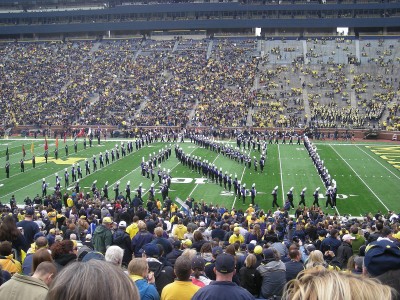
In March and April of 2014, University of Connecticut point guard Shabazz Napier was on top of the world. The senior and Roxbury native had become the most beloved college basketball player on the planet. The 6-foot-1 underdog led the Huskies through the NCAA Tournament, and his fearless style of play kept fans on the edge of their seats time and time again.
But a week before the National Championship game — where Napier would go on to lead the Huskies to the school’s fourth national title — the All-American completely dropped a bomb on the NCAA and college sports when he uttered the 11 most infamous words in recent college sport history.
“There’s hungry nights that I go to bed and I’m starving.”
At the time, Napier was speaking of the NCAA’s meal plan policy that only allowed players one training meal per day as part of a stipend. Within weeks of Napier’s comments, which spurred widespread outrage, the NCAA legislative council approved a new meal plan that gives student-athletes unlimited meals and snacks.
The timing of the legislation was quite interesting, but Napier’s comments brought up a more powerful message about the state of the NCAA.
Whether or not you agree on the “founding principles” of college athletics and the value of a free education, the NCAA is a multi-billion dollar business that exploits its players and treats its student-athletes more like Barbie Dolls than young people trying to navigate this crazy world in which we live.
This whole issue is rooted in the very definition of the term “student-athlete,” which was created in the 1950s when the widow of a football player tried to receive workmen’s-compensation death benefits but was denied that right by the Colorado Supreme Court.
In today’s landscape, the term “student-athlete” essentially means that every college athlete is considered an amateur and not an employee of his or her respective university. Therefore student-athletes have no collective bargaining rights and can’t receive workers compensation if he or she gets injured on the job — which, last time I checked, happens quite often in college sports.
And when you also consider the NCAA’s shameful medical insurance policy, you quickly realize that the student-athletes are the ones risking everything and reaping none of the benefits.
Currently, the NCAA requires every student-athlete to have health insurance, but it’s the student-athletes who are often forced to pay for their injury expenses. If a player has a career-ending injury, the NCAA can revoke the player’s scholarship and force the student-athlete to pay for his or her medical bills out of pocket.
So let’s get this straight.
The guy going up and down the stadium stairs yelling, “Come grab your popcorn and beer!” receives workers compensation if he falls on his butt and breaks his tailbone?
Yup.
And the esteemed university president is medically insured if he drops a plate of oysters on his foot and breaks his toe?
You bet.
But the athletes themselves — the ones who are sacrificing their bodies and their livelihoods for the people who paid $60 to yell and scream at from their tiny bleacher seats — receive no workers compensation and are potentially liable to cover all of their medical expenses if they fall victim to injury?
That’s right.
Sadly, this happens every year and far too often. And if you think radical change is on the horizon, think again.
On Aug. 17, the National Labor Relations Board voted unanimously to decline to assert jurisdiction on the Northwestern University football team and its right to unionize. Led by former Northwestern quarterback Kain Colter, the Wildcats’ push for unionization was, and still is, the most legitimate threat to the NCAA and its exploitation of student-athletes. But at public universities like The Ohio State University, the school’s student-athletes are bound by a state law which says that student-athletes are not employees of their university and therefore can’t unionize.
So let’s put this into proper perspective.
I, Isaac Chipps, made more money working at Panda Express inside the George Sherman Union, legally as a university employee, than Cardale Jones — who could’ve injured himself and lost out on millions of dollars in the NFL — did sacrificing his body in leading the Buckeyes to a national title last season.
How does this make any sense and how is this fair?
For athletes who are loathed, loved, scrutinized and glamorized on TV as much (if not more) than their counterpart professionals, how is it right that they receive no financial compensation for their hard work and exposure they bring to their universities?
The answer? It’s not.
There is some change coming, but not nearly enough.
Starting this season, schools in the “Power Five” conferences will be giving their student-athletes stipends, but the amounts vary tremendously depending on the school. The University of Tennessee will give its athletes $5,666 annually, but our neighbors over at Boston College will be giving its athletes just $1,400 annually.
So what’s the perfect solution to this incredibly exploitative system that has failed our beloved athletes?
Believe me, I wish I knew the answer, but I do know that there is something fundamentally wrong with the way college athletics handles its business. And if you think the status quo of a “free education” is more than enough to supplement the rest of these athletes’ lives, why don’t you speak with the football and basketball players at the University of North Carolina that were funneled into classes which never existed and weren’t given any kind of first-class education.
A billion-dollar industry has taken advantage of young men and women who live and die to play the games we love to watch, and it makes me sick at night knowing that my fellow students are struggling in every aspect of life because they are bound by a ruthless system that treats its players more like puppets than humans.
Napier struck a nerve in my body that put life into perspective for me. When’s the last time you went to bed hungry? In fact, when’s the last time you went six hours without food in your body or were told you could only have one meal per day? Think about that, and then get back to me.
Isaac is a sports columnist for The Daily Free Press and a High School Sports Correspondent for The Boston Globe. Born and raised in Columbus, Ohio, Isaac spent the 2015 summer interning at USA TODAY Sports and For The Win. Aside from his love of sports, Isaac has a severe Chipotle addiction and an unhealthy love affair with Ohio State football. Follow him on Twitter @IsaacChipps

